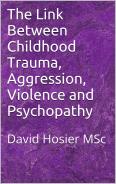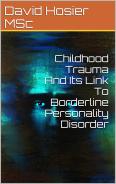Tags
Childhood Trauma: The Link with Future Violence. Part One.
A research study (Fonagy et al., 1997) showed that 90% of young offenders had suffered significant childhood trauma, including both abuse and loss (eg. of a parent through divorce). Neglect in childhood was also a very significant factor in greatly increasing the risk of later violent offending. Violent offending following such trauma is sometimes referred to as ‘acting out’.
THE EFFECTS OF LOSS DURING CHILDHOOD.
The psychologist Bowlby (1969) studied the effects of loss in childhood (eg. through parental divorce). He demonstrated that it very often led to the child responding by passing through three stages:
1) PROTEST (due to SEPARATION ANXIETY).
2) DESPAIR (due to grief over the loss. NB. The loss need not be due to death).
3) EMOTIONAL DETACHMENT (a defense mechanism).
Following loss, if the child is not treated sympathetically and emotionally supported, his or her response to the loss can become pathological.
TYPES OF LOSS.
Two types of loss that the child might experience are death of a parent or parental divorce. But a feeling of loss can, in fact, be just as damaging (or, indeed, even more damaging) following less overt forms of loss. For example:
-parental rejection
-parental threats to abandon the child
-parental neglect/lack of emotional involvement
-parental abuse
-parents not giving the child love
Later work by Bowlby (1979) has shown that children often ‘re-experience’ their childhood loss in later life when faced with further separation and loss, or the threat of it, in their adult relationships. This may be expressed by the individual ‘re-experiencing’ his or her feelings of childhood loss by reacting with violence, anger and hatred.
Furthermore, these dysfunctional response patterns are resistant to change as the individual’s perception of adult relationships becomes distorted by their experience of childhood loss (in essence, leading to error-correcting information being defensively and selectively excluded from consciousness).
CHILDHOOD TRAUMA AND LATER DIFFICULTIES REGULATING INTERNAL STATES/EMOTIONS.
Further research (Van der Kolk et al., 1995) has shown that childhood trauma can lead to the individual experiencing a deep feeling of terror which he or she is unable to articulate; this in turn leads to the individual experiencing extreme problems in relation to regulating internal states/emotions. Indeed, this dysfunction is biological in origin, as the biological state of the individual has been adversely affected by the childhood trauma.
HABITUAL AND REPETITIVE RELATIONSHIP DIFFICULTIES (ATTACHMENT DISORDER) IN ADULT LIFE FOLLOWING CHILDHOOD TRAUMA.
It has also been demonstrated by research that, following loss-related childhood trauma, the individual’s adult relationships very frequently induce great feelings of insecurity (‘attachment insecurity’/attachment disorder/attachment anxiety) in later life and that these reponses to interpersonal relationships become repetitive and habitual.This can, and, often does, lead the individual to adopt dysfunctional coping strategies including alcohol and drug misuse, violence and crime.
Further research into the connection between childhood trauma and its links to subsequent violent behaviour in adulthood will be examined in Part Two, to be published shortly.
Above eBook now available for immediate download from Amazon. $3.49 CLICK HERE.
Best wishes, David Hosier BSc Hons; MSc; PGDE(FAHE).




